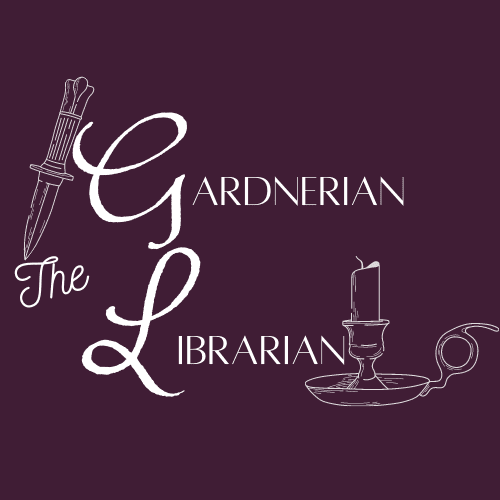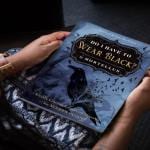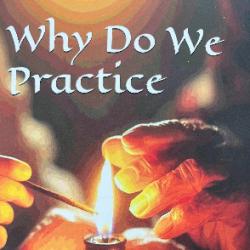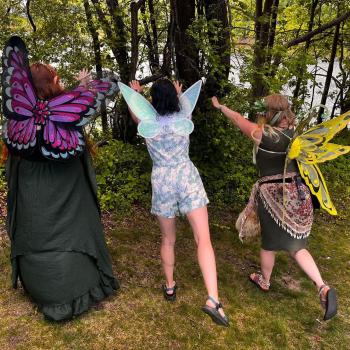I’m sure I’m not the only person to have struggled with this, but sometimes I find it difficult to articulate myself. “But, Ash, your 5 billion word blog posts suggest otherwise!” Damn right they do. My posts suggest that I can babble like a brook if I’m not careful. I find that in an attempt to make myself understood I can over explain a topic or point ad nauseam. There are better ways to not only talk about your witchy interests but also research them. Below, I list three quick and easy tools that may help you get your research back on track. Leave the Crazy Train to Ozzy Osbourne.
Tip 1: Concept Map
Concept mapping is one seriously legit way to simplify your research. Hell yes! Let us hearken back to the days of grade school when our teachers taught us this tool for our essay papers.

Concept maps help us break a topic down by its parts. Concept maps also help us see the connections between topics we may have otherwise thought unrelated. Have you ever heard of the Six Degrees of Separation? A Hungarian author named Frigyes Karinthy theorized in 1929 that, on average, all people are only six or fewer social connections away from one another. Rad. I bet that bro was a pro at concept mapping.
Concept maps are like the Six Degrees of Separation in that they can show us a similar connection between two topics. We can begin with a singular topic, which is usually pretty broad. From there, we begin “mapping” out as many similar topics or sub-topics that relate to that first one. For example, let’s map out Wicca. “Wicca” is a broad topic that I can connect with well-known traditions, influential people, and common practices. Did you know there’s a tiny connection between Wicca and Russia? I’ll show you where in my own crappily-drawn concept map:
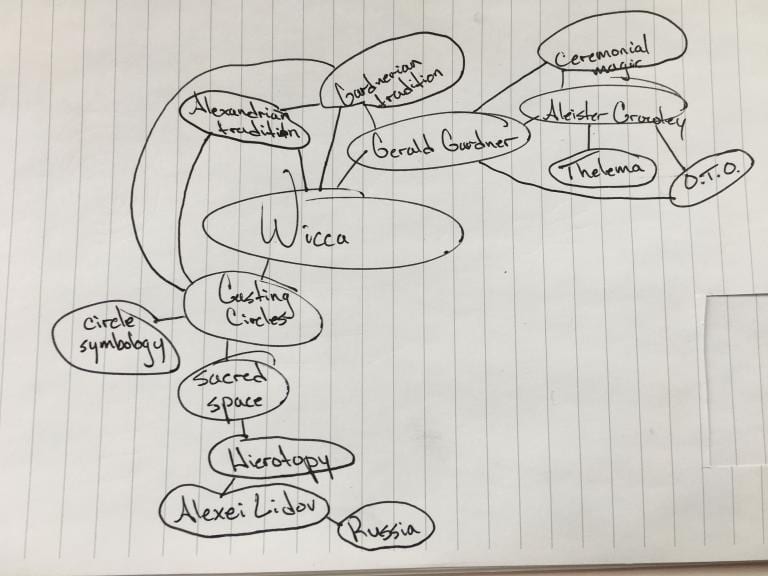
So, after doing all that you might wonder why it matters to connect Russia and Wicca together. The point is that you’re first trying to broadly cover as many bases as you can while doing research on a topic. Those bases include: the topic itself, related topics, issues surrounding that topic, and current scholarship on the topic. The concept map serves as a visual tool for quickly observing those connections and helping you choose which route(s) you want to take in your research.
Lastly, the concept map can keep your research focused if you keep it brief. The pitfall is that it can also send you down a research rabbithole if you make your map too large. In the example above, by the time we get to “Russia” as a connection to “Wicca”, we’re already five steps away from my original topic. In my opinion, it’s too far from where my focus should be and therefore unhelpful.
My tip: don’t pull a Karinthy and map out topics or subjects that are too far from the center of your original topic. Stick to four or fewer connections, if possible.
Tip 2: Keyword-smithing
AKA “How to Tubal Cain the shit out of some witchy words”

The key to any successful Internet search is damn good keywords. Keywords unlock online doors, my friends. The difference between using “firetruck” OR “a large red vehicle that carries a shitton of water and dalmatians” is huge. Here are some tips for creating good search engine keywords:
- Create succinct word combos for more relevant search results. The fewer words you use in a search, the better.
- Steer clear of using questions in the search box. Search engines like Google aren’t designed to give answers but relevant results to the words typed in a search box. Search engines will take every word that you entered and crawl webpages for those exact words. The websites that get returned to you may or may not be what you’re looking for, but the search engine performed its duty correctly. You have to be smarter than the search engine or database that you’re using, though.
- Use a thesaurus for synonyms. There may be terms you haven’t considered being related to your original word(s).
- Nouns and verbs make the best keywords. Leave out prepositions and conjunctions, if you can.
- If you started with a concept map, consider using the words from the map in your searches.
- If there’s an exact phrase with words that have a specific spelling, consider using quotation marks around the search phrase. Quotation marks, if needed, are only useful for two or more keywords in a search. “Besom, Stang, and Sword” will return more precise results, for example, than that phrase without the quotation marks. That’s not to say you won’t get what you’re looking for without the quotation marks. However, you’ll get more precise results if you use them when they’re most needed. Use them for book titles, author names, and passage quotes for A+ search results.
Tip 3: Narrow Your Topic
Let’s imagine we’re doing research on magical texts. “Magical texts” is a super broad topic and it’ll return a ton of online results, so it might be worth narrowing the topic a bit. Here are some questions you can ask yourself to help narrow your topic. I like to use the 5 W’s and H (Who, What, When, Where, Why and How), for starters:
- Who are you researching? A magical author or culture that has magical texts? Example: Heinrich Cornelius Agrippa or Ancient Egypt.
- What/Which text are you researching? Example: The Book of the Dead or Greek Magical Papyri.
- When was this text published? Or, is there a specific time period of magical texts you’d like to research? This helps with historical context.
- Where was this text written or published? Knowing the location can help you understand its cultural context.
- Why was this text written? What purpose did/does it serve?
- How was it written? By hand? In another language? Digitally?
Asking the above questions will assist you in focusing on the important details of your topic. From there, you can head off in numerous directions but your basis of understanding will be set.
I hope you found the above tips helpful! For more tips like these and more:
Follow me on Instagram @thegardnerianlibrarian
